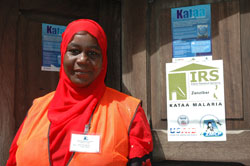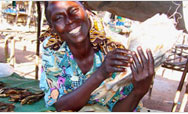You are here » Home » Telling Our Story
Success Story
Anti-malaria campaign reduces the number of infections
Zanzibari Women Fight Malaria

| |
Photo: USAID/Imani M. Cheers
|
|
Jamila Hassan, Team Leader of Zanzibar Urban District Indoor Residual Sprayers, has had malaria 15 times. Now, she helps to protect members of her community from the disease.
“It is my job to help prevent communicable disease and all Zanzibaris are ready for indoor residual spraying,” says Jamila Hassan who is an indoor residual sprayer team leader.
|
For over 25 years, Jamila Hassan, 44, has worked for the Zanzibar Health Ministry. As an educator, health advocate, and mother of three she has dedicated her life to the welfare of her family and community. She has had malaria 15 times and her 19-year-old son, Saadiq, is currently infected.
In Tanzania, an estimated 80,000 children under five die from the disease each year. The President’s Malaria Initiative, launched in 2005, aims to reduce malaria-related deaths by at least 50 percent over five years. USAID is aiding this initiative by helping Tanzania’s Zanzibar islands gain access to long-lasting insecticidal nets, use indoor residual spraying, get fast and effective treatment with new drugs, and provide preventive treatment to pregnant women.
As part of the indoor residual spraying component, 454 people were hired and trained to spray and supervise spraying of homes with insecticide in June 2006. Jamila is the only female supervisor in the Zanzibar Urban district, and she has made it her goal to “continue educating women about how to protect themselves and their families from malaria and other diseases.” Mariam Juma, a 25-year-old HIV/AIDS advocate in the Zanzibar Urban district, was one of the women inspired by Jamila. She was eager to help control and prevent malaria deaths in her community. Over two months, Mariam and 454 other workers will canvass the islands of Unguja and Pemba and spray 216,000 homes, chanting: “Udhibiti wa mbu kataa malaria!” or “I reject malaria, control mosquitoes!”
On July 9, 2006, USAID and the Zanzibar Malaria Control Program launched a $2 million campaign with the goal of spraying most homes in the Zanzibar archipelago before the start of the rainy season in October. At the program’s launch ceremony, U.S. Ambassador to Tanzania Michael Retzer recalled the initiative’s successes. For example, in May 2006, there were an estimated 7,700 fewer reported malaria cases and 200 fewer deaths of children under five than in May 2005. At the end of his speech, the Ambassador predicted a positive turnaround for the island: “You are definitely on your way to a better, healthier future,” he said. With continued hard work from residents and assistance from USAID, they are on their way to fulfilling this goal.
Print-friendly version of this page (420kb - PDF)
Click here for high-res photo
Back to Top ^ | 

